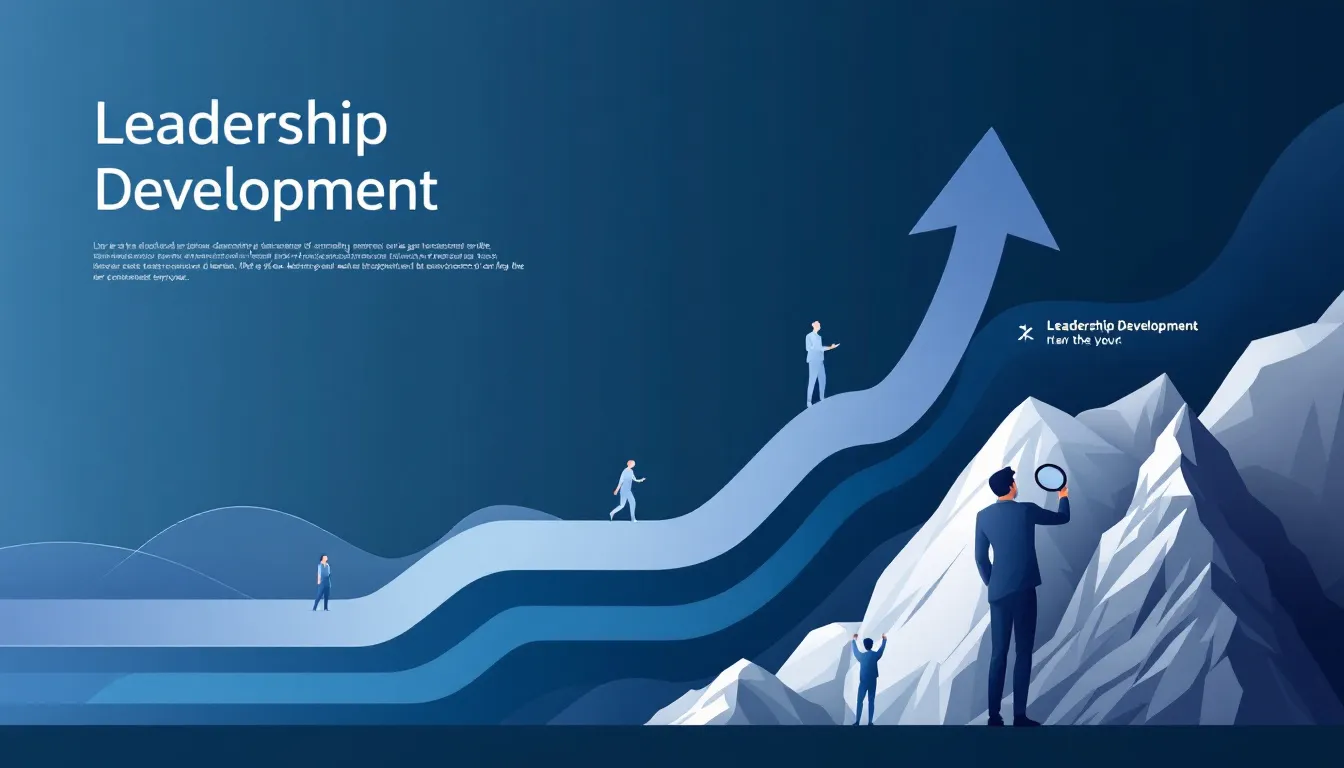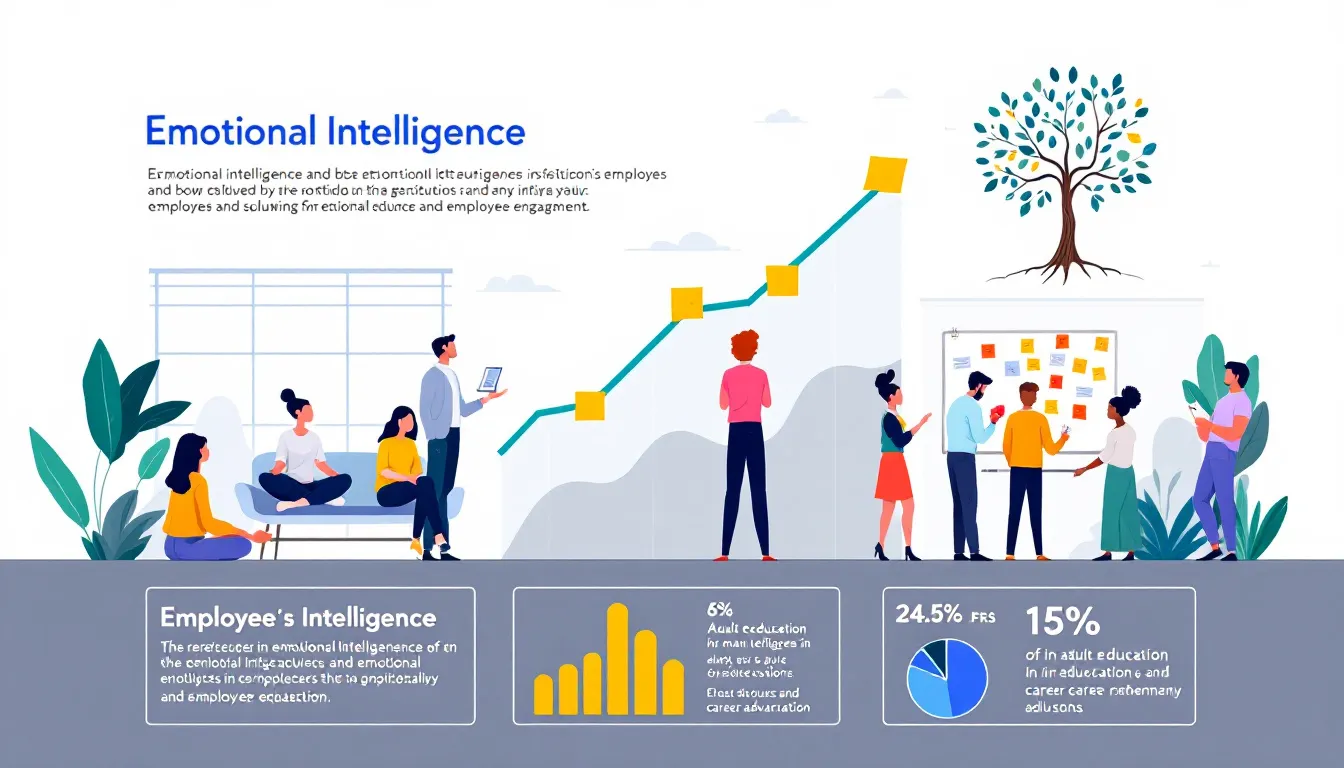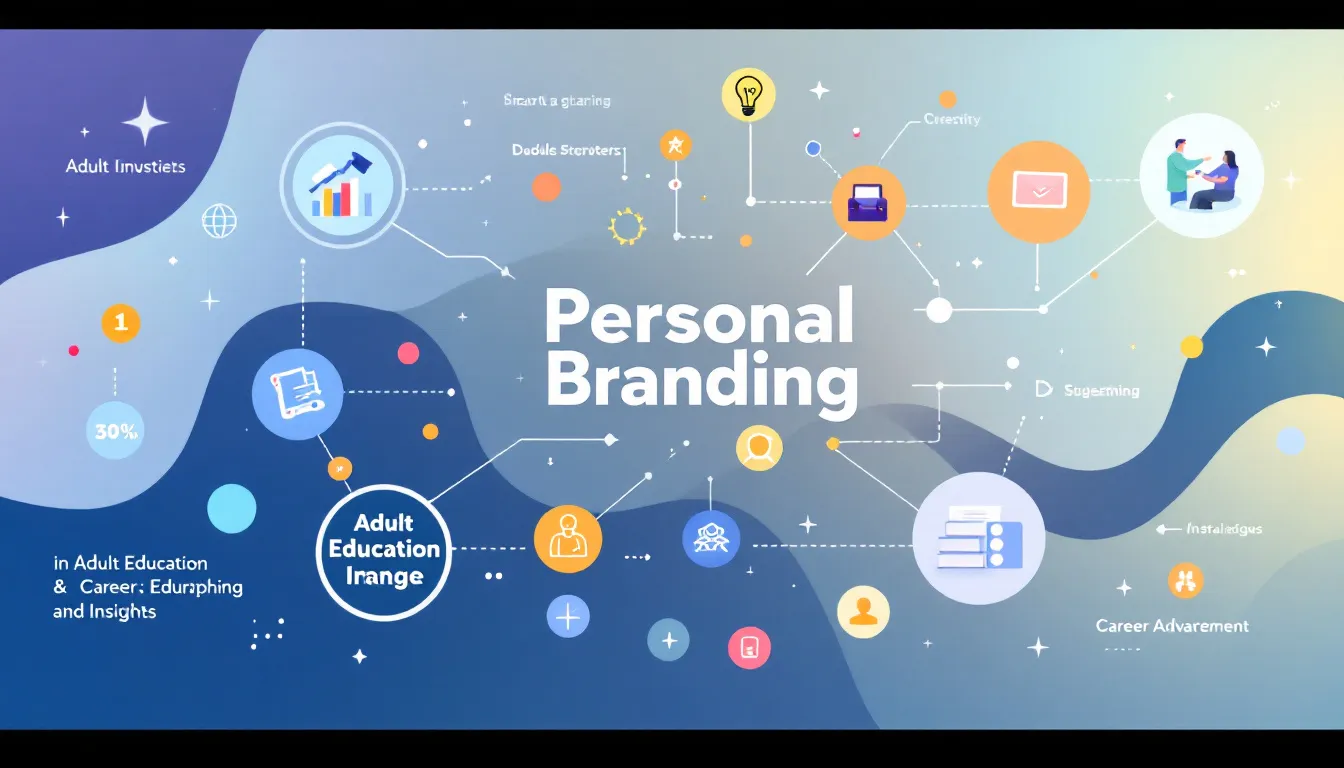Essential professional development topics such as communication, leadership, and time management are vital for advancing your career. Effective communication and emotional intelligence are essential for fostering teamwork, transparency, and collaboration, which directly impact career advancement.
Continuous learning, including leadership development and technical skills enhancement, is crucial for adapting to rapid changes and achieving professional growth. Additionally, conflict resolution, stress management, skill development, and ethics training are necessary for creating a positive work environment and promoting employee well-being and productivity. Investing in professional development also demonstrates a commitment to employee well-being, which can contribute to reducing turnover. Discover the skills that can elevate your career success and drive professional growth.
1. Effective Communication Skills

Effective communication underpins any successful business, involving not just information exchange but also grasping the emotions and intentions behind it. Clear and effective communication fosters transparency, builds trust, and promotes collaboration. In today’s complex work environments, communication skills have become indispensable.
Employers frequently utilize workshops, games, and activities to bolster communication skills among employees. These programs focus on developing skills such as active listening, clarity, and brevity, greatly enhancing message effectiveness. Additionally, creating a positive organizational culture can further improve communication and trust among employees. It is also crucial to teach team members how to communicate bad news or negative feedback effectively without harming morale.
Effective conflict management techniques further facilitate better communication and emotional understanding among team members. This reduces workplace stress and boosts overall productivity by aligning team members. Indeed, effective communication is an invaluable skill for career advancement and professional growth.
2. Leadership Development
Another crucial aspect of professional growth is leadership development. Leadership programs must align with specific organizational goals to achieve relevant outcomes. Tailoring course content to address specific skills gaps and organizational needs is essential. Involving senior leaders in training programs can significantly enhance relevance and learner engagement, ultimately improving leadership skills and preparing individuals for various leadership roles as future leaders. Additionally, skill development is essential for fostering effective leadership.
For leaders to adapt to rapid business changes, continuous learning is necessary. Tailoring content to different leadership levels and gathering feedback helps monitor progress and optimize future programs. Concentrating on key performance outcomes guarantees maximum impact.
3. Time Management Techniques
Effective time management maximizes productivity for project managers, meets deadlines, and balances workloads, which are crucial for career advancement. Microsoft Teams proficiency in time management significantly boosts their productivity. Proficient time management directly increases productivity and reduces stress levels.
Setting task deadlines creates urgency and improves time efficiency. Appropriate task delegation frees up time for higher-priority projects. Using a calendar or planner significantly enhances time organization and helps teams meet deadlines. Reviewing and reflecting on time usage identifies areas for improvement.
4. Conflict Resolution Strategies
Mastering conflict resolution promotes well-being and enhances productivity across different work environments. Improving team dynamics and making individuals valuable assets hinges on mastering conflict resolution. Effective conflict resolution transforms potential breakdowns into breakthroughs, ultimately benefiting clients .
Organizations can enhance employee skills by creating workshops or training series on conflict resolution. Many organizations use role-playing scenarios to help employees practice emotional responses to different situations. Empathy mapping activities help employees understand different perspectives, thus improving team collaboration.
5. Emotional Intelligence
Emotional intelligence (EI) involves recognizing and managing one’s emotions and expressing them effectively. Developing EI fosters empathy, understanding, loyalty, and productivity, motivating and inspiring others, enhancing connections, and building better teams.
Journaling about emotional experiences facilitates self-reflection and better emotion processing in the workplace. An emotion wheel helps participants identify and articulate their feelings, enhancing emotional understanding. Mindfulness meditation enhances self-awareness and improves emotional regulation within teams.
6. Stress Management and Resilience
Stress can cause health issues like anxiety and unhealthy lifestyle choices, negatively impacting performance. Effective stress management, alongside self-care, is vital for maintaining work-life balance and enhancing organizational culture. Employers should train employees to recognize and respond to stress, equipping them with essential skills.
Promoting health and wellness significantly boosts job satisfaction and motivation. Hosting stress management seminars equips employees with human resources to manage stress more effectively. A health-focused supportive environment enhances productivity and employee well being and loyalty.
7. Technical Skills Enhancement
Technical skills are crucial for a future-ready workforce. Investing in technical training and professional development keeps employees competitive and adaptable to changing technologies. The skills needed to leverage technology effectively enable employees to thrive and acquire new skills.
Skill gaps can lead to financial losses, underscoring the need for technical training and expertise. Untrained employees may fumble calls, lose notes, and reduce customer satisfaction, which can have a direct impact on overall business success, making a big difference in outcomes. Skill enhancement is essential to address these gaps.
8. Project Management Skills
Project management skills enhance efficiency, improve decision-making, boost team collaboration, and support agile responses. Poor planning is often cited as a leading cause of project failure, underscoring the importance of planning in project management.
Effective project management requires familiarity with management tools and software to guide teams and manage resources efficiently. A project management degree or certificate enhances practical skills through training sessions and connects learners with industry experts for career growth.
9. Diversity and Inclusion Training
DEI initiatives training helps individuals identify unconscious biases. Workplace sensitivity training addresses cultural issues and prevents offensive situations. Insensitivity in a diverse workplace can create tension and may require HR intervention.
Diversity and inclusion training improves company culture and helps reach target audiences. Celebrating workplace diversity benefits businesses and promotes inclusivity.
Harassment awareness and prevention courses contribute to a positive environment and teach how to confront harassment.
10. Public Speaking and Presentation Skills
Public speaking skills are crucial for conveying ideas and showcasing hard work, inspiring action and making a difference. Public speaking workshops and training offer practical experience and constructive feedback, helping participants craft and deliver memorable presentations.
Public speaking practice can reduce anxiety and boost overall communication confidence, helping you feel confident. An unprepared presenter may create confusion, while a polished presentation can lead to opportunities, recognition, and respect.
11. Negotiation Skills Training
Negotiation skills are vital for conflict resolution and decision-making. They also facilitate collaboration and achieving mutually beneficial outcomes. Negotiation fosters collaboration and mutual respect, essential for effective conflict resolution.
Negotiation training includes workshops, seminars, and role-playing activities to help individuals practice and improve their skills during training sessions. Tailored negotiation programs with real-world scenarios help participants learn techniques to apply skills effectively in their roles.
12. Personal Branding and Professional Image
Personal branding enables individuals to articulate their unique attributes and value, attracting relevant career opportunities. A well-defined personal brand enhances confidence, clarifies goals, and supports relationship building, reducing feelings of inadequacy.
Building a personal brand requires regularly reassessing and adjusting one’s professional image. Creating a strong personal brand involves identifying one’s values, purpose, and unique contributions. Expanding one’s brand through strategic connections can enhance its reach and influence on career growth.
13. Continuous Learning and Development
Organizations with training programs see higher employee retention rates. Continuous professional development enhances career success, demonstrates commitment, and boosts employee confidence. Professional development encompasses training courses, degree programs, certifications, and mentoring. Professional development in team building can facilitate better teamwork and provide practical activities and resources to encourage engagement in team-oriented tasks.
Workshops and industry events are key for continuous learning and developing essential project management skills. Online platforms like Degreed offer personalized learning and skill-building throughout employees’ careers. AI-enhanced learning platforms can personalize training experiences for employees.
14. Customer Service Excellence
Organizations prioritizing customer experience often see faster revenue growth. Satisfied customers share positive experiences and build trust. Patience, understanding, empathy, adaptability, and composure are essential for enhancing customer experience.
Customer service proficiency is crucial for project managers to ensure stakeholder satisfaction throughout a project. Customer service training instills a customer-first mindset in organizations. Customer service development equips employees with tools to handle difficult customers and improve negative experiences.
15. Coaching and Mentorship Programs
Mentorship provides guidance that is crucial for career development and navigating professional paths. Mentors can open new networking opportunities and resources, significantly influencing career advancement.
Mentoring and coaching programs offer one-on-one support tailored to individual needs, goals, and challenges. Experienced mentors and coaches share wisdom, insights, best practices, and industry knowledge. A strong mentor-mentee long-term relationship relies on trust, transparency, and open communication.
16. Critical Thinking and Problem Solving
Critical thinking is vital for making informed decisions and effectively solving workplace issues. Employees trained in critical thinking navigate crises better by quickly assessing options. Critical thinking is crucial for solving complex issues and identifying effective solutions.
Critical thinking involves understanding the issue, considering all perspectives, and arriving at a conclusion. Training enhances the ability to organize complex problems into manageable parts.
Creative problem solving provides teams with the tools they need to transform obstacles into opportunities. It also encourages them to explore various possibilities.
17. Change Management Training
Change management training equips employees with the skills to embrace new challenges. It also encourages them to foster innovation in their work. It’s essential for successful implementation during organizational changes. Training in change management is crucial for helping employees adjust to new processes and technologies effectively.
Effective change management training helps cultivate a constructive attitude towards change, viewing it as a growth opportunity. Delivering constructive feedback can diminish resistance to change through targeted training that addresses employee concerns and builds trust.
Tailoring training videos to specific employee groups focuses on enhancing its effectiveness by meeting the unique needs of diverse teams.
18. Health and Wellness Programs
Promoting health topics at work can decrease mental health issues, obesity, and other health complications among employees. Biometric testing can identify potential health risks among employees, allowing for early intervention.
Wellness programs that address employee interests and concerns can be more effective in promoting health. Incorporating group exercises into the workday can help maintain employee physical health, improve morale, and boost employee engagement. Fitness wearables can help employees monitor their health metrics, encouraging physical activity during work hours.
19. Data Literacy
Data literacy is the ability to interpret, analyze, and make decisions based on data. Data literacy acts as a vehicle to understand insights into the market. Training programs in data literacy can significantly empower employees with knowledge at all levels to make informed decisions based on data.
Data literacy helps employees transform data into actionable insights that drive business outcomes. Effective data training equips employees with the ability to visualize and communicate data findings clearly. Every department, including marketing and HR, can benefit from data literacy skills.
20. Ethics and Integrity in the Workplace
Ethics are crucial in a company’s culture as they inform how deals are conducted. Integrating ethics in training helps build trust among stakeholders. Compliance training applies to all employees, ensuring everyone is aware of legal and ethical responsibilities.
A sales representative must decide whether to hide a product flaw or disclose the truth, showcasing the importance of ethical decision-making. This kind of decision-making process instills a culture of integrity within the workplace.
21. Human Resources and Performance Management
Human Resources (HR) plays a pivotal role in managing an organization’s workforce, encompassing recruitment, training, and performance management. Effective HR practices are instrumental in boosting employee satisfaction, productivity, and retention, which are crucial for organizational success.
Performance management is a cornerstone of HR, involving regular evaluations, feedback, and goal-setting to ensure employees meet organizational objectives. HR professionals must excel in communication skills, emotional intelligence, and leadership abilities to manage conflicts and negotiate effectively with employees.
Continuous learning and professional development are vital for HR professionals to stay abreast of evolving laws, regulations, and industry best practices. By providing strategic guidance on talent management, diversity and inclusion, and employee engagement, HR can significantly contribute to business success.
Inclusion training is essential for HR professionals to foster a positive and inclusive work environment, promoting diversity and reducing bias. Career advancement opportunities, mentorship programs, and training sessions are crucial for HR professionals to develop the skills needed to excel in their roles.
Delivering constructive feedback, managing conflicts, and negotiating with employees are key responsibilities of HR professionals. Effective HR practices provide a competitive edge, enabling organizations to attract and retain top talent, ultimately driving business success.
22. Career Planning and Goal-Setting
Career planning and goal-setting are fundamental for employees aiming to achieve their professional objectives and advance in their careers. Effective career planning involves conducting a SWOT analysis to identify strengths, weaknesses, opportunities, and threats, thereby creating a personalized development plan.
Goal-setting requires establishing specific, measurable, achievable, relevant, and time-bound (SMART) objectives that align with organizational goals. Employees need strong self-awareness, emotional intelligence, and critical thinking skills to create effective career plans and set achievable goals.
Continuous learning and professional development are crucial for employees to stay current with industry trends and acquire new skills. Mentorship programs, training sessions, and online platforms provide the resources and support necessary to achieve career goals.
Career advancement opportunities, promotions, and lateral moves can significantly enhance job satisfaction and career progression. Effective career planning and goal-setting lead to increased employee engagement, motivation, and productivity.
Employees must prioritize tasks, manage time effectively, and focus on high-priority goals to achieve success. Regular feedback, coaching, and evaluation are essential for staying on track with career plans and making necessary adjustments. By investing in career planning and goal-setting, employees can ensure that their professional growth aligns with their aspirations and organizational goals.
Elevate Your Career with Professional Development
Unlock your potential by exploring diverse professional development topics that enhance communication skills, leadership capabilities, and technical expertise. These invaluable skills not only boost your career but also contribute to a positive work environment. For those looking to make a direct impact on their career progression, consider investing in professional resume writing services to effectively showcase your enhanced skills and experiences. This strategic approach can provide a competitive edge in the job market, ensuring your professional growth aligns with your career aspirations.












